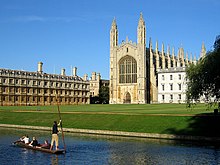Education
Education in the United Kingdom is a devolved matter, with each country having a separate education system.
Considering the four systems together, about 38 per cent of the United Kingdom population has a university or college degree, which is the highest percentage in Europe, and among the highest percentages in the world.[453][454] The United Kingdom trails only the United States in terms of representation on lists of top 100 universities.[455][456][457][458]
A government commission's report in 2014 found that privately educated people comprise 7 per cent of the general population of the UK but much larger percentages of the top professions, the most extreme case quoted being 71 per cent of senior judges.[459][460]
England
Whilst education in England is the responsibility of the Secretary of State for Education, the day-to-day administration and funding of state schools is the responsibility of local authorities.[461] Universally free of charge state education was introduced piecemeal between 1870 and 1944.[462][463] Education is now mandatory from ages five to sixteen, and in England youngsters must stay in education or training until they are 18.[464] In 2011, the Trends in International Mathematics and Science Study (TIMSS) rated 13–14-year-old pupils in England and Wales 10th in the world for maths and 9th for science.[465] The majority of children are educated in state-sector schools, a small proportion of which select on the grounds of academic ability. Two of the top ten performing schools in terms of GCSE results in 2006 were state-run grammar schools. In 2010, over half of places at the University of Oxford and the University of Cambridge were taken by students from state schools,[466] while the proportion of children in England attending private schools is around 7 per cent, which rises to 18 per cent of those over 16.[467][468] England has the two oldest universities in English-speaking world, Universities of Oxford and Cambridge (jointly known as "Oxbridge") with history of over eight centuries.[citation needed]
Since the establishment of Bedford College (London), Girton College (Cambridge) and Somerville College (Oxford) in the 19th century, women also can obtain a university degree.[citation needed]
Scotland
Education in Scotland is the responsibility of the Cabinet Secretary for Education and Lifelong Learning, with day-to-day administration and funding of state schools the responsibility of Local Authorities. Two non-departmental public bodies have key roles in Scottish education. The Scottish Qualifications Authority is responsible for the development, accreditation, assessment and certification of qualifications other than degrees which are delivered at secondary schools, post-secondary colleges of further education and other centres.[469] Learning and Teaching Scotland provides advice, resources and staff development to education professionals.[470] Scotland first legislated for compulsory education in 1496.[471] The proportion of children in Scotland attending private schools is just over 4 per cent in 2016, but it has been falling slowly in recent years.[472] Scottish students who attend Scottish universities pay neither tuition fees nor graduate endowment charges, as fees were abolished in 2001 and the graduate endowment scheme was abolished in 2008.[473]
Wales
The Welsh Government has responsibility for education in Wales. A significant number of Welsh students are taught either wholly or largely in the Welsh language; lessons in Welsh are compulsory for all until the age of 16.[474] There are plans to increase the provision of Welsh-medium schools as part of the policy of creating a fully bilingual Wales.[citation needed]
Northern Ireland
Education in Northern Ireland is the responsibility of the Minister of Education, although responsibility at a local level is administered by the Education Authority which is further sub-divided into five geographical areas. The Council for the Curriculum, Examinations & Assessment (CCEA) is the body responsible for advising the government on what should be taught in Northern Ireland's schools, monitoring standards and awarding qualifications.[475]
Health
Healthcare in the United Kingdom is a devolved matter and each country has its own system of private and publicly funded health care. Public healthcare is provided to all UK permanent residents and is mostly free at the point of need, being paid for from general taxation. The World Health Organization, in 2000, ranked the provision of healthcare in the United Kingdom as fifteenth best in Europe and eighteenth in the world.[476][477] Since 1979 expenditure on healthcare has been increased significantly to bring it closer to the European Union average.[478] The UK spends around 8.4 per cent of its gross domestic product on healthcare, which is 0.5 percentage points below the Organisation for Economic Co-operation and Development average and about one percentage point below the average of the European Union.[479]
Regulatory bodies are organised on a UK-wide basis such as the General Medical Council, the Nursing and Midwifery Council and non-governmental-based, such as the Royal Colleges. Political and operational responsibility for healthcare lies with four national executives; healthcare in England is the responsibility of the UK Government; healthcare in Northern Ireland is the responsibility of the Northern Ireland Executive; healthcare in Scotland is the responsibility of the Scottish Government; and healthcare in Wales is the responsibility of the Welsh Government. Each National Health Service has different policies and priorities, resulting in contrasts.[480][481]




No comments:
Post a Comment